Nelson Kim’s 2019 New York Film Festival Report
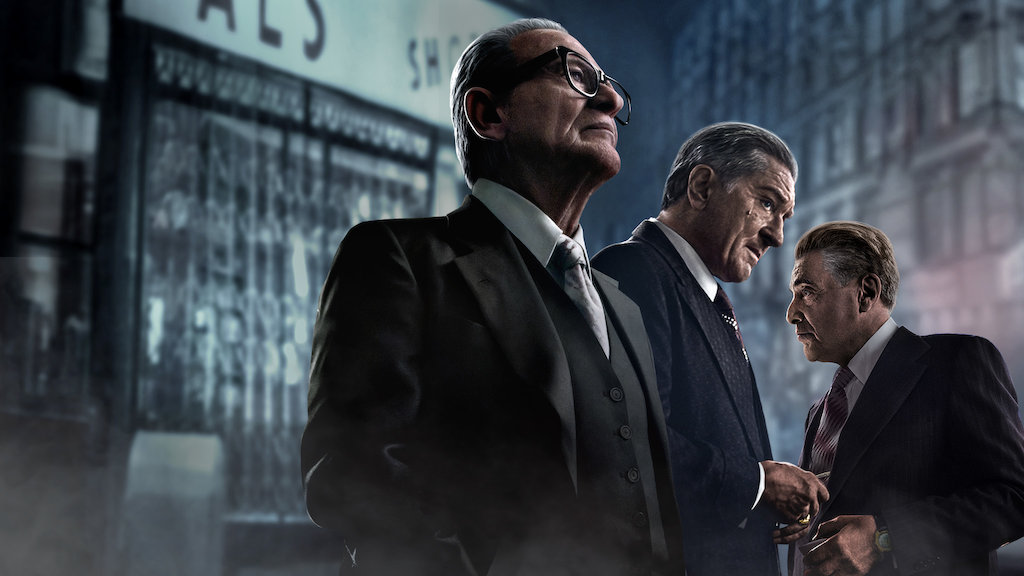
 The 2019 New York Film Festival began with a bang — the world premiere of Martin Scorsese’s feverishly anticipated The Irishman. And The Irishman itself ended with a whimper, or something close to it: This long (three and a half hours), violent, event-filled epic that sweeps through five decades of American history slows down in its final half hour to become a quiet, melancholy study of old age. After playing a part in everything from the Bay of Pigs to the killings of Joey Gallo and Jimmy Hoffa, former Teamster official and mob hitman Frank Sheeran (Robert DeNiro) is confined to his wheelchair in a nursing home, contemplating the wreck he’s made of his life and wondering at the possibility of redemption. These scenes are relentless in their accumulation of everyday horrors: the deaths of friends, the decline of the body and the dulling of the mind, the dreariness of empty days passing combined with the dread of time running out. This is the end we’ll all face (if we’re lucky), but seeing The Irishman makes you realize how few movies are actually willing to go there.
The 2019 New York Film Festival began with a bang — the world premiere of Martin Scorsese’s feverishly anticipated The Irishman. And The Irishman itself ended with a whimper, or something close to it: This long (three and a half hours), violent, event-filled epic that sweeps through five decades of American history slows down in its final half hour to become a quiet, melancholy study of old age. After playing a part in everything from the Bay of Pigs to the killings of Joey Gallo and Jimmy Hoffa, former Teamster official and mob hitman Frank Sheeran (Robert DeNiro) is confined to his wheelchair in a nursing home, contemplating the wreck he’s made of his life and wondering at the possibility of redemption. These scenes are relentless in their accumulation of everyday horrors: the deaths of friends, the decline of the body and the dulling of the mind, the dreariness of empty days passing combined with the dread of time running out. This is the end we’ll all face (if we’re lucky), but seeing The Irishman makes you realize how few movies are actually willing to go there.
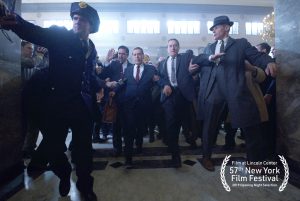 The last section of The Irishman gives shape and meaning to all that comes before, and it’s the best and most original part of the film — despite the grimness of the subject, you can feel Scorsese’s excitement in articulating something he has never previously expressed onscreen. Whereas the three hours that precede it are the work of a skilled artisan practicing his craft. There are excellent things in those three hours, the strongest perhaps being Al Pacino’s grand, soulful performance as Hoffa, and Sheehan/DeNiro’s exquisitely painful betrayal of their friendship. The movie is expertly paced, often funny, at times gripping and moving. It’s also conventional to a fault in form and style, much of it shot and edited with the bland classicism of a very good television series. For all its pleasures, The Irishman shows once again that working on a very large-scale, expensive production (cf. Gangs of New York, The Aviator, and Hugo) tends to inhibit the great man’s inventive genius.
The last section of The Irishman gives shape and meaning to all that comes before, and it’s the best and most original part of the film — despite the grimness of the subject, you can feel Scorsese’s excitement in articulating something he has never previously expressed onscreen. Whereas the three hours that precede it are the work of a skilled artisan practicing his craft. There are excellent things in those three hours, the strongest perhaps being Al Pacino’s grand, soulful performance as Hoffa, and Sheehan/DeNiro’s exquisitely painful betrayal of their friendship. The movie is expertly paced, often funny, at times gripping and moving. It’s also conventional to a fault in form and style, much of it shot and edited with the bland classicism of a very good television series. For all its pleasures, The Irishman shows once again that working on a very large-scale, expensive production (cf. Gangs of New York, The Aviator, and Hugo) tends to inhibit the great man’s inventive genius.
On the other side of the world, and at the other extreme of moviemaking, is the Portugeuse director Pedro Costa, who continues his decades-long project of giving voice to the dispossessed of Lisbon with Vitalina Varela, which is both the title of his new film and the name of its lead actress. The narrative, constructed by Varela and Costa over months of discussion and rehearsal, draws directly from Varela’s own life: She flew to Portugal from her native Cape Verde to bury her dead husband Joaquim, who had deserted her decades earlier. Although Lisbon seems to have nothing to offer her, she stays, moving into Joaquim’s decrepit apartment and stewing in her anger and grief.
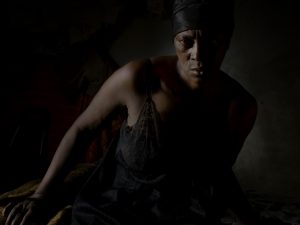 There’s little story progression in Costa’s films; they’re elliptical, mysterious, glacially paced snapshots of mood and feeling, memory and dream. Vitalina meets Joaquim’s friends, reminisces about the house they built together in Cape Verde before he left for Portugal, wonders where their love went astray. Apparently this wasn’t enough for the handful of viewers who walked out of the press-and-industry screening I attended, but it was plenty for me. The focus on Vitalina’s yearning and heartache make this the most emotionally direct and accessible film of Costa’s that I’ve seen. And he and his regular cinematographer Leonardo Simões continue to refine an aesthetic that’s one of the marvels of modern movies — to call it a “style” seems insufficient, as their approach involves a wholesale rethinking of everything we associate with traditional narrative filmmaking. They shoot with the tiniest of crews and the most limited of means, in austere environments with minimal lighting; they don’t invent stories and then cast performers to fill them but instead construct the movies around the performers (often Cape Verdean immigrants like Vitalina) and their lives. Costa’s is a cinema of paradoxes: The films are highly formalized, with an unmistakable look and feel, yet in crucial ways the director seems to surrender much of the authorship and control to his subjects. It’s their personal histories that generate the narratives, their bodies and faces that the unblinking, unmoving camera fixates upon, their words and voices that dominate the spare soundscape. One feels the director’s hand in every frame; one also knows the films would be nothing without the dazed and damaged souls who populate them.
There’s little story progression in Costa’s films; they’re elliptical, mysterious, glacially paced snapshots of mood and feeling, memory and dream. Vitalina meets Joaquim’s friends, reminisces about the house they built together in Cape Verde before he left for Portugal, wonders where their love went astray. Apparently this wasn’t enough for the handful of viewers who walked out of the press-and-industry screening I attended, but it was plenty for me. The focus on Vitalina’s yearning and heartache make this the most emotionally direct and accessible film of Costa’s that I’ve seen. And he and his regular cinematographer Leonardo Simões continue to refine an aesthetic that’s one of the marvels of modern movies — to call it a “style” seems insufficient, as their approach involves a wholesale rethinking of everything we associate with traditional narrative filmmaking. They shoot with the tiniest of crews and the most limited of means, in austere environments with minimal lighting; they don’t invent stories and then cast performers to fill them but instead construct the movies around the performers (often Cape Verdean immigrants like Vitalina) and their lives. Costa’s is a cinema of paradoxes: The films are highly formalized, with an unmistakable look and feel, yet in crucial ways the director seems to surrender much of the authorship and control to his subjects. It’s their personal histories that generate the narratives, their bodies and faces that the unblinking, unmoving camera fixates upon, their words and voices that dominate the spare soundscape. One feels the director’s hand in every frame; one also knows the films would be nothing without the dazed and damaged souls who populate them.
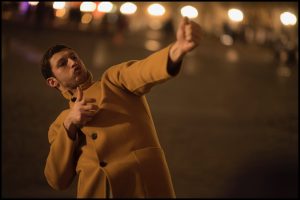 Two directors new to me screened their third features at NYFF, and both films made me eager to catch up with their earlier work: Nadav Lapid’s Synonyms, and Justine Triet’s Sybil. Lapid’s film is a character study built around a most unusual character. Yoav (Tom Mercier, extraordinary in his film debut) is a young Israeli who recently completed his mandatory military service and has now fled to Paris, where he attempts to make himself over as a Frenchman. He refuses to speak Hebrew and condemns his homeland as odious, repugnant, fetid, crude, ignorant, and other words he picks up from his obsessive study of the French dictionary. Yoav is a dynamo, a dervish, pinballing through Paris in search of self-transformation and belonging, but the madness he thinks he can escape by running away from Israel is inside him. And of course, the French are all crazy too.
Two directors new to me screened their third features at NYFF, and both films made me eager to catch up with their earlier work: Nadav Lapid’s Synonyms, and Justine Triet’s Sybil. Lapid’s film is a character study built around a most unusual character. Yoav (Tom Mercier, extraordinary in his film debut) is a young Israeli who recently completed his mandatory military service and has now fled to Paris, where he attempts to make himself over as a Frenchman. He refuses to speak Hebrew and condemns his homeland as odious, repugnant, fetid, crude, ignorant, and other words he picks up from his obsessive study of the French dictionary. Yoav is a dynamo, a dervish, pinballing through Paris in search of self-transformation and belonging, but the madness he thinks he can escape by running away from Israel is inside him. And of course, the French are all crazy too.
Lapid structures the film episodically, with the only narrative throughline being Yoav’s connection to a bourgeois couple who befriends him. Scene after scene is charged with energy and invention and wit, but Synonyms never really builds toward a meaningful climax that would give the whole a greater resonance than its parts. Yet the movie feels like a triumph regardless. If Yoav is ultimately more interesting than the story that contains him, he’s one of the most inspired film protagonists in years. Maybe not since Mike Leigh’s Naked has a movie made me imagine that the main character might at any moment jump off the screen and escape into the streets.
Sibyl, directed by Justine Triet from a script by Triet and Arthur Harari, is a smart, fast-paced art-house entertainment that mixes genres and tones in novel combinations. The title character, played by Virginie Efira, is a Parisian psychotherapist who gives up her practice to reignite a writing career that stalled years earlier, only to find that she has nothing to write about. She reluctantly agrees to take on a new patient, a movie actress named Margot (Adèle Exarchopoulos), who’s sleeping with her male co-star behind their director’s back. Complicating matters is that the co-star and the director are a longtime couple. The troubled Margot turns out to be the muse Sibyl needs; she begins secretly recording their therapy sessions and turning the material into fiction. Meanwhile, a series of flashbacks (deftly edited by Laurent Sénéchal) reveals that Sibyl is hurtling toward a mental-health crisis of her own.
 The movie stays ahead of the viewer, spinning off in surprising directions — it begins as a seemingly straightforward drama and then takes on aspects of an erotic thriller, a Bergmanesque existential freakout, and most unexpectedly and delightfully, a screwball farce during a long sequence in which Sibyl visits Margot on location in Stromboli. (Sandra Hüller of Toni Erdmann fame gives a tour de force comic performance as Mika, the cheated-upon director.) Sibyl, Margot, and Mika form a kind of triptych, giving us contrasting portraits of women in personal and professional crisis. The end of the movie shows Sibyl finding her equilibrium again after a disastrous collapse, but Triet refuses us easy closure, hinting that Sibyl’s demons are only temporarily at bay.
The movie stays ahead of the viewer, spinning off in surprising directions — it begins as a seemingly straightforward drama and then takes on aspects of an erotic thriller, a Bergmanesque existential freakout, and most unexpectedly and delightfully, a screwball farce during a long sequence in which Sibyl visits Margot on location in Stromboli. (Sandra Hüller of Toni Erdmann fame gives a tour de force comic performance as Mika, the cheated-upon director.) Sibyl, Margot, and Mika form a kind of triptych, giving us contrasting portraits of women in personal and professional crisis. The end of the movie shows Sibyl finding her equilibrium again after a disastrous collapse, but Triet refuses us easy closure, hinting that Sibyl’s demons are only temporarily at bay.
Olivier Assayas’ Wasp Network is a fact-based spy thriller, adapted from the Brazilian writer Fernando Morais’ nonfiction book The Last Soldiers of the Cold War: The Story of the Cuban Five. It begins in 1990, as Cuban pilot and military veteran René Gonzalez (Édgar Ramirez) commandeers a plane and flies to Miami, declaring himself a refugee from Castro’s repressive regime. His wife Olga Salanueva (Penélope Cruz) and their daughter, left behind in Havana, are forced to reckon with the consequences of his betrayal. René is soon joined by another defecting pilot, Juan Pablo Roque (Wagner Moura). Both men are recruited to fly for militant anti-Castro groups, rescuing migrants from boats and dropping propaganda leaflets over Cuban airspace. But there are shadowy forces at work in Miami, from drug smugglers to violent splinter groups to undercover Cuban agents sent to infiltrate the anti-Castro network, and in an inspired mid-film twist, we learn that our protagonists are not who they seem to be.
 Assayas gives us a lot of movie here, maybe too much. The storytelling is energetic, the subject matter fascinating, the cast appealing, the locations stimulating to look at (the Cuban government gave the French/Spanish/Brazilian production extraordinary access to the country). But as the narrative complications pile up, and major shifts in the main characters’ lives are dispensed with in expository asides, the movie starts to feel like mere reconstruction, as if Assayas, burdened by the obligation to stay close to the historical record, is speeding through a checklist of events. There’s also a disjunction between the cool-headed, just-the-facts vibe of the more plot-driven scenes, where Assayas seems to be aiming for an approach similar to The Battle of Algiers or Z, and the moments of moist-eyed domestic melodrama as the pilots face the personal consequences of their choices (Cruz and Ana de Armas do what they can with the sketchily written suffering-woman roles). Wasp Network probably needed to be either warmer (developing the characters’ psychological and emotional lives more fully) or colder (committing to the detached docudrama mode), instead of shuttling uneasily between the two temperatures.
Assayas gives us a lot of movie here, maybe too much. The storytelling is energetic, the subject matter fascinating, the cast appealing, the locations stimulating to look at (the Cuban government gave the French/Spanish/Brazilian production extraordinary access to the country). But as the narrative complications pile up, and major shifts in the main characters’ lives are dispensed with in expository asides, the movie starts to feel like mere reconstruction, as if Assayas, burdened by the obligation to stay close to the historical record, is speeding through a checklist of events. There’s also a disjunction between the cool-headed, just-the-facts vibe of the more plot-driven scenes, where Assayas seems to be aiming for an approach similar to The Battle of Algiers or Z, and the moments of moist-eyed domestic melodrama as the pilots face the personal consequences of their choices (Cruz and Ana de Armas do what they can with the sketchily written suffering-woman roles). Wasp Network probably needed to be either warmer (developing the characters’ psychological and emotional lives more fully) or colder (committing to the detached docudrama mode), instead of shuttling uneasily between the two temperatures.
If a title can be said to offer a movie’s first impression to the viewer, then Roee Messinger’s American Trial: The Eric Garner Story suggests we might be in for a dutiful, unimaginative documentary treatment of an important subject. In fact, Messinger’s first feature is a revelation: an urgent and compelling film so formally innovative that it feels as if you’re witnessing the birth of a new genre.
Most of us are familiar with the facts of the case: Eric Garner died at the hands of NYPD officer Daniel Pantaleo in July 2014. After months of deliberation, a Staten Island grand jury voted not to indict Pantaleo; the subsequent protests helped bring the Black Lives Matter movement to national consciousness. (In 2015, the city paid the Garner family a multi-million dollar settlement. In August of this year, after a yearslong federal investigation also failed to result in charges, a disciplinary hearing initiated by the NYPD led to Pantaleo being fired.) American Trial asks what might have happened if the Staten Island grand jury had brought charges against Pantaleo — that imaginary trial is the entire substance of the movie. We see lawyers for both sides gathering evidence, building a case, and pre-interviewing witnesses, and then we spend the bulk of the film in the courthouse as the trial takes place.
 Messinger took a bold gamble in creating the movie entirely through structured improvisations by the cast. And who is in the cast? One professional actor (Anthony Altieri), playing Pantaleo. Garner’s widow, Esaw Snipes Garner, playing herself. James Knight, Garner’s friend and a witness to his attempted arrest and death, playing himself. All the others are real-life practitioners of the jobs their “characters” hold in the film: The prosecutors are played by lawyers with prosecutorial experience; the defense attorneys are played by defense attorneys; expert witnesses for both sides are actual doctors, cops, and retired cops who regularly testify in real trials, and so on. Messinger guided and shaped the improvisations, but allowed his cast to decide upon the legal strategies, trial procedures, and testimonies seen in the film.
Messinger took a bold gamble in creating the movie entirely through structured improvisations by the cast. And who is in the cast? One professional actor (Anthony Altieri), playing Pantaleo. Garner’s widow, Esaw Snipes Garner, playing herself. James Knight, Garner’s friend and a witness to his attempted arrest and death, playing himself. All the others are real-life practitioners of the jobs their “characters” hold in the film: The prosecutors are played by lawyers with prosecutorial experience; the defense attorneys are played by defense attorneys; expert witnesses for both sides are actual doctors, cops, and retired cops who regularly testify in real trials, and so on. Messinger guided and shaped the improvisations, but allowed his cast to decide upon the legal strategies, trial procedures, and testimonies seen in the film.
Norman Mailer, writing about Last Tango in Paris in 1973, proposed a new kind of improvisation-based approach to moviemaking, in terms that come close to what Messinger has delivered decades later:
So the following and imaginary film is offered: Orson Welles to play Churchill while Burton or Olivier does Beaverbrook in the week of Dunkirk. Let us assume we have the great good fortune to find these actors at the height of their powers, and have for auteur a filmmaker who is also a brilliant historian. To these beginnings, he adds a company of intelligent English actors and gives them the same historical material to study in order to provide a common denominator to everyone’s knowledge. At this point the auteur and the company agree upon a few premises of plot. The auteur will offer specific situations….
Then a narrative action can begin to emerge out of the interplay of the characters, in much the way a good party turns out differently from the expectations of the hostess and yet will develop out of her original conception…. Why assume that the wits of this company of intelligent English actors will have less knowledge of manner and history than an overextended scriptwriter trying to work up his remote conception of what Churchill and Beaverbrook might have been like? Why not assume Welles and Burton have a better idea? Are they not more likely to contain instinctive knowledge in their ambulating meat? Isn’t the company, in its steeping as good British actors into their own history, able to reveal to us more of what such a week might have been like than any but the most inspired effort by a screenwriter?
Messinger’s film commits to Mailer’s idea but goes beyond it: His performers/co-writers are not actors spinning ideas out of a few weeks’ intensive research, but people who have spent their lives in the roles depicted in the movie, and bring to the story an intimate knowledge of the American legal system. In granting them the freedom to deploy that knowledge on screen, and in sticking so rigorously to the facts of the real case and to how such a trial would have actually played out, American Trial achieves a kind of — to coin a paradoxical phrase — imaginative authenticity lacking in wilder speculative fictions of the what-if-Hitler-had-never-lived variety. Maybe this never happened, one thinks while watching, but it could have, and if it did, it probably would have happened in a manner much like this. The commitment to verisimilitude is felt in the details of legal procedure, the dialogue and performances (acting coaches could use these scenes as reference guides for several outer-borough NYC accents), and even the look of the film, which so perfectly mimics the style of a conventional documentary that a friend who arrived a few minutes late to the screening and had no knowledge of the movie’s premise didn’t realize the trial was staged until explanatory titles appeared at the end. (This friend directs, produces, and edits documentaries for a living.)
 From the opening statements to the witness testimonies and cross-examinations to the closing arguments, the film gives ample time to both prosecution and defense. It puts the viewer in the position of a jury member, sifting the evidence, sniffing out the holes in logic, weighing the conflicting claims to truth. In various large and small ways, the filmmakers have their thumbs on the scale — few will doubt the movie was put together by people who believe Garner’s death was a colossal injustice. But it takes great care to be fair to both sides, and in so doing it engenders fairness in the audience. Only the most narrow-minded ideologue could sit through it and not concede that the opposition might have made some valid points. At a time when the partisan divide in this country feels almost beyond fixing, American Trial might be performing a much-needed public service by forcing us to live with nuance and uncertainty for 100 minutes.
From the opening statements to the witness testimonies and cross-examinations to the closing arguments, the film gives ample time to both prosecution and defense. It puts the viewer in the position of a jury member, sifting the evidence, sniffing out the holes in logic, weighing the conflicting claims to truth. In various large and small ways, the filmmakers have their thumbs on the scale — few will doubt the movie was put together by people who believe Garner’s death was a colossal injustice. But it takes great care to be fair to both sides, and in so doing it engenders fairness in the audience. Only the most narrow-minded ideologue could sit through it and not concede that the opposition might have made some valid points. At a time when the partisan divide in this country feels almost beyond fixing, American Trial might be performing a much-needed public service by forcing us to live with nuance and uncertainty for 100 minutes.
The movie is absorbing from start to finish, but the most powerful moment by far comes during the end credits, as Messinger shows us footage of Esaw Snipes Garner, filmed moments after she shot her fictionalized testimony for the trial scenes, breaking down in tears. She says between sobs that she didn’t realize how painful it would be to testify, since she never had the chance to do so in real life. This is something else American Trial accomplishes: By staging this trial, even in a fictional context, the film enacts a kind of cultural catharsis. Even if we believe justice was denied in the real world, there’s something satisfying about seeing the facts brought out in the open — and seeing Snipes Garner get her day in court.
— Nelson Kim
Like what you see here on Hammer to Nail? Why not pay just $1.00 per month via Patreon to help keep us going?








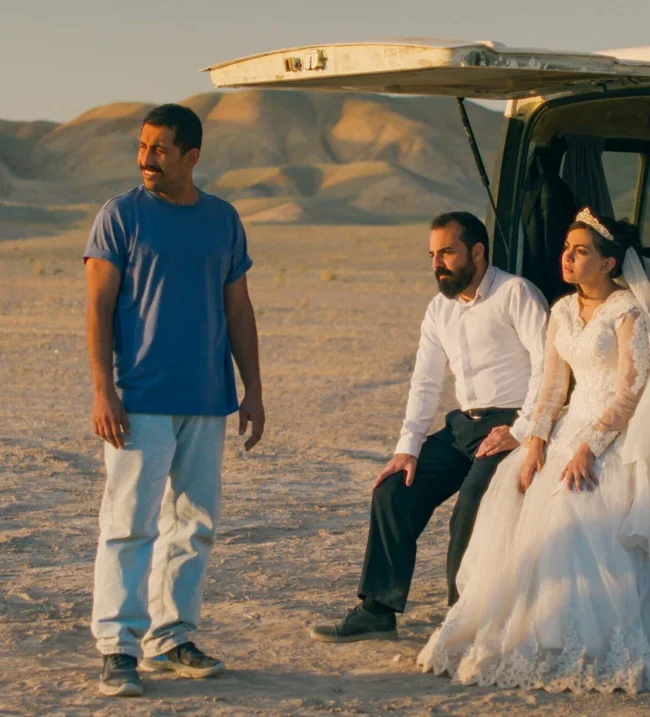
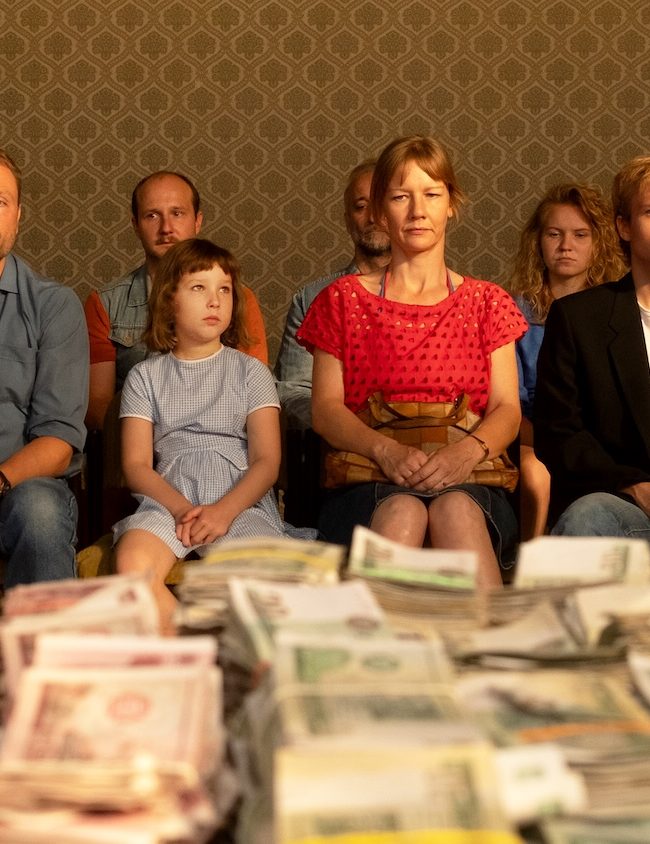


Chloroform Wiggins
To write that VITALINA VARELA has a “spare soundscape” is a bit misleading. The soundtrack behind the voices, the sounds of the barrio, is incredibly complex, loud even: next door conversations, arguments, televisions, animals, sewers, music, candles burning, off-screen characters, rain, shouts, birds (“I have always been excited by birds in the evening skies” a man says in Dovzhenko’s POEM OF THE SEA), Ventura’s trembling hands against his clothes, dogs. It is part of the exhilaration of this film and its total resonance.
Linda Johanna
Thank you for the up-front appraisal of the Scorsese (that I’ll see as soon as I can) and for turning me on to some other very interesting ideas of film going on rn.
Nelson
Sorry to be so late in seeing these comments. Right you are about the soundscape of Costa’s films — they are indeed layered and evocative, and “subtle” would be a better word choice than “spare”!